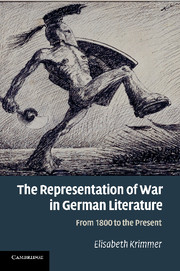Book contents
- Frontmatter
- Contents
- Acknowledgments
- 1 Introduction
- PART I THE REVOLUTIONARY AND NAPOLEONIC WARS
- PART II THE FIRST WORLD WAR
- PART III THE SECOND WORLD WAR
- 8 The Second World War: overview
- 9 War and victimization: Böll
- 10 War and accountability: Grass
- PART IV YUGOSLAVIA AND IRAQ
- 14 Conclusion
- Notes
- Bibliography
- Index
8 - The Second World War: overview
Published online by Cambridge University Press: 06 July 2010
- Frontmatter
- Contents
- Acknowledgments
- 1 Introduction
- PART I THE REVOLUTIONARY AND NAPOLEONIC WARS
- PART II THE FIRST WORLD WAR
- PART III THE SECOND WORLD WAR
- 8 The Second World War: overview
- 9 War and victimization: Böll
- 10 War and accountability: Grass
- PART IV YUGOSLAVIA AND IRAQ
- 14 Conclusion
- Notes
- Bibliography
- Index
Summary
's ist leider Krieg – und ich begehre
Nicht schuld daran zu sein
(Sadly, there is a war,
And I desire not to be to blame for it)
(Matthias Claudius, Kriegslied)As the previous part has shown, First World War writers probe the sublime and transformative aspects of war and are concerned with the devastating impact of new weapons, the dynamic of battles, and the body in pain. In contrast, the epoch-making texts of the post-1945 period do not focus on the experience of frontline fighting. Rather, the horror of the front recedes behind issues of guilt and suffering: the guilt incurred in the unprecedented magnitude of the crime of genocide and the suffering born by millions of civilians and soldiers.
Of course, to say that the most prominent Second World War texts are not primarily concerned with day-to-day combat is not to deny that there are texts that deal with war in traditional ways, ranging from Gert Ledig's Die Stalinorgel (The Stalin Organ, 1955), Gerd Gaiser's Die sterbende Jagd (The Dying Hunt, 1953), and Reinhart Stalmann's Staub (Dust, 1951) to the numerous works on the military disaster of Stalingrad, ranging from Theodor Plivier's Stalingrad (1945) to Heinz Konsalik's Der Arzt von Stalingrad (The Doctor of Stalingrad, 1956). But none of these works have come to define the literature of the Second World War. Their readership is rather limited, and they have received little critical attention.
- Type
- Chapter
- Information
- The Representation of War in German LiteratureFrom 1800 to the Present, pp. 107 - 113Publisher: Cambridge University PressPrint publication year: 2010



